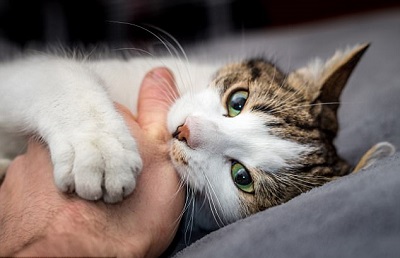They often have a funny way of showing their affection, but domestic cats may owe their love of curling up on human laps to the ancient Egyptians.
A genetic study on feline remains dating back 9,000 years has revealed a lineage of cats from Egypt began spreading around the world around 3,000 years ago.
These creatures interbred with local animals and left distinct DNA that persist in our pets to this day.
The scientists behind the research believe the Egyptian cats were so successful because they had developed traits that made them better ‘companions’ than other types of wildcat.
They say ancient Egyptians and those trading with them may have transported these cats in ships to far off ports, allowing the animals to pass on genes that made their descendants friendlier to humans.
Dr Eva-Maria Geigl, a molecular anthropologist, said: ‘The peculiar social and cultural context of the Egyptian society may have facilitated the evolution of a more ‘friendly’ disposition of cats towards humans.
‘Their popularity as a companion animal, together with its role as pest control agent on ships, might have determined the success of the Egyptian cat in spreading along trade routes.’
The research, gives the first detailed look at the genetics underlying early cat domestication.
Unlike dogs, which were domesticated at least 14,600 years ago, cat were domesticated relatively late.
It is thought wildcats initially began living alongside humans to take advantage of the rodents that were attracted to early Stone Age farms and were tamed by humans leaving food for them.
Dr Geigl and her colleagues tested the remains of 352 ancient cats – including several Egyptian cat mummies – dating back to around 9,000 years ago.
They say this suggests humans were moving these cats, perhaps to help them combat pests as they established farming communities.
Cats are also known to have been living in close quarters with people in ancient Egypt from at least 3,700BC, and a number of skeletons have been found in cemeteries dating from that period.
Dr Geigl and her colleagues said these cats appear to have been extremely popular, perhaps due to changes in their genetic make up that made them tamer and more sociable than other cats
This led to a ‘tightening of the human-cat relationship’ that persists to this day.
The researchers also found the distinctive tabby markings that are present on nearly 80 per cent of domestic cats today only began appearing in the Middle Ages. According to Daily mail
N.H.Kh

